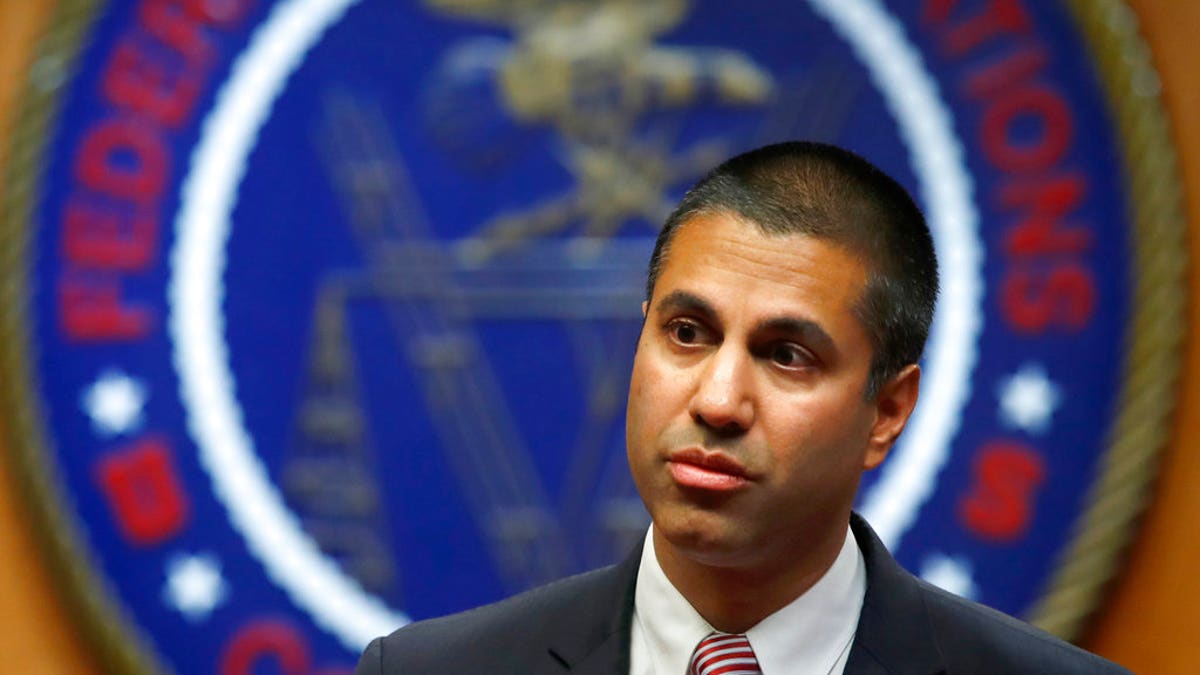
FCC Commissioner Ajit Pai (Associated Press)
The FCC on Wednesday voted to ease restrictions on the rollout of equipment needed to deploy 5G networks, but detractors argue the move strips authority from local governments and deprives them of needed revenue.
As the agency outlines in its report, 5G will require mobile providers to "deploy infrastructure at significantly more locations using new, small cell facilities."
The rollout of 3G and 4G required "the construction of large, 200-foot towers," the FCC says. This time around, "upwards of 80 percent of all new deployments will be small cells [so] providers must build out small cells at a faster pace and at a far greater density of deployment than before."
Doing so, however, requires cooperation with state and local governments, which can be a costly and time-consuming endeavor. So the FCC today ruled that state and local governments cannot charge exorbitant fees and must approve applications in a timely manner. That includes 60 days to review applications for attaching small cell facilities to existing structures and 90 days for constructing new ones.
More From PCmag
This, the FCC says, will "eliminate around $2 billion in unnecessary costs, which would stimulate around $2.5 billion of additional buildouts."
Carriers like AT&T says the move "will foster more widespread and robust infrastructure investment." But groups like Common Cause said it will hurt rural areas that still lack adequate 3G and 4G service.
"The FCC's actions also hurt state and local government abilities to negotiate any public interest obligations like buildout requirements or anti-redlining provisions," Michael Copps, a former Democratic FCC commissioner and Common Cause special adviser, said in a statement. "This gives wireless companies even more of an ability to only deploy 5G to the richest parts of a city, leaving low-income areas unserved."
The order, Copps argues, is just "a corporate welfare plan that only widens the digital divide."
Free Press Policy Manager Dana Floberg echoed those sentiments. "Placing the blame for disconnected communities primarily on municipal authorities is merely a distraction from the unfortunate reality that wireless companies and others often refuse to serve or upgrade in poor and rural areas because they don't see the profit in it," she said.
"Just because the FCC's order might save the carriers a paltry 1 percent of their 5G deployment costs does not mean that money would be reinvested in communities stranded on the wrong side of the digital divide," Floberg said.
Earlier today, FCC Chairman Ajit Pai acknowledged that "there are some local governments that don't like this order. They would like to continue extracting as much money as possible in fees from the private sector and forcing companies to navigate a maze of regulatory hurdles in order to deploy wireless infrastructure.
"But these actions are not only unlawful, they're also short-sighted," Pai continued. "They slow the construction of 5G networks and will delay if not prevent the benefits of 5G from reaching American consumers. And let's also be clear about one thing: When you raise the cost of deploying wireless infrastructure, it is those who live in areas where the investment case is the most marginal—rural areas or lower-income urban areas—who are most at risk of losing out. And I don't want 5G to widen the digital divide; I want 5G to help close that divide."
The Consumer Technology Association (CTA), which runs CES, said in a statement that the FCC's order "helps keep America in the lead in the global race for 5G." Its beef is with President Trump's tariffs.
"Tariff-driven cost increases are a tax on 5G that will increase costs and dramatically slow infrastructure deployment. In the global race for 5G leadership, increasing U.S. equipment costs actually helps China in an area where the U.S. should be dominating," said Michael Petricone, SVP of government and regulatory affairs.
That's something Democratic Commissioner Jessica Rosenworcel, who dissented in part on today's order, wrote in an a Wednesday Politico op-ed. On Twitter, she argued that "The United States wants to lead in the race to the next generation of wireless service, known as #5G. Then why are we getting into a trade war with China that will raise the price of essential 5G network equipment by 25%? This makes no sense."
For more, see our chat with Commissioner Rosenworcel from MWC below.
This article originally appeared on PCMag.com.




















